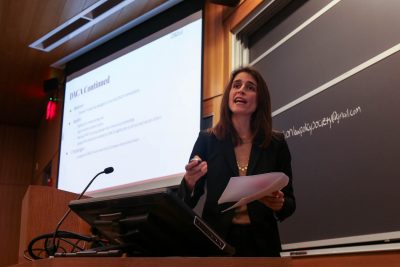
More than 40 students gathered in the Boston University School of Law Tuesday night for a teach-in to discuss the presidential election and its effects on the future of immigration policy.
The discussion was hosted by the law school’s Immigration Law and Policy Society. The group invited students who could be directly affected by President-elect Donald Trump’s possible immigration policies. These students, allies and the larger BU community gathered to discuss how to prepare and educate immigrant communities.
Sarah Sherman-Stokes, a BU Law lecturer, led the discussion. She spoke about five main components of Trump’s possible immigration policy: rescinding the “deferred action for childhood arrivals” program, expanding detention and deportation of criminal aliens, creating a registry of Muslims, starting immigrant/refugee bans and ending birthright citizenship.
“I think it’s prudent to take his words as a promise,” Sherman-Stokes said during the presentation. “For better or for worse, immigration policy was a cornerstone of Trump’s campaign, and I think he really capitalized on the fear people have. I think it’s important to us as lawyers, as law students and as students in general to understand what that rhetoric means, and what it could look like.”
Mario Paredes, a second-year law student at BU who helped organize the function, said he wanted to hold this discussion as a way to harness some of the energy from the election on campus.
“Spaces like these are critically important right now so that by the time the new administration takes office, we know how to help defend immigrant communities,” Paredes said prior to the presentation. “There are some policies that seem very likely to be implemented, while others seem legally and logistically unlikely. By exploring these issues, we hope to decrease fear in some areas and more importantly, mobilize us to action in other areas.”
Paredes said this event is one of many happening around the country to keep immigrants’ rights at the forefront of local and national conversations.
“Immigrant communities are among the most vulnerable communities in the United States and often used as scapegoats for our current economic and social dilemmas,” Paredes said. “This was the last opportunity of the semester to gather affected students and allies together to discuss how immigrants may bear the brunt of a lot of the new administration’s policies.”
BU President Robert Brown signed an open letter last week, urging the nation to preserve DACA. Paredes encouraged BU to continue this trend in being proactive, rather than reactive, in protecting immigrants’ rights during Trump’s presidency.
“Although that is a good first step, there is a lot more that BU can do to be proactive in protecting all of its students and preparing for the future,” Paredes said. “Instead of waiting [to see] what happens over the next few months or the next few years, we would like the administration to build off the momentum of the petition that is circulating and be a leader.”
Students at the discussion were encouraged to sign a petition on Facebook to make BU a “sanctuary campus” for immigrants. The petition asks BU to use Marsh Chapel as a physical place of sanctuary and protection for the local undocumented community, to pledge that the immigration status of applicants will not factor into admissions or financial aid decisions, and not to cooperate with the U.S. Immigrations and Customs Enforcement or U.S. Customs and Border Protection.
Several students said they learned a lot about the potential impacts of Trump’s presidency.
Lucille Billings, a sophomore in the College of Arts and Sciences, said she came to the discussion to learn more about what could happen under a Trump presidency.
“Everybody deserves equal human rights, so we need to make sure that our laws and policies will allow for people to be afforded those rights in this country,” Billings said before the discussion.
For Jamie Allendorf, a junior in the College of Communication, the topic is more personal.
“My mother is an immigrant and I think right now, since the election, it’s something we need to pay attention to,” Allendorf said prior to the discussion. “Trump has riled up people who are very nationalist and very anti-immigrant, so it’s his supporters even more than him who are concerning.”
CAS senior Zoe Neubauer said the discussion was informative, especially for someone who does not have a background in law.
“I definitely know more about law and immigration policy now,” Neubauer said after the discussion. “I signed the sanctuary petition already — but I mean, Trump just got elected, so it’s important to try and know what’s going on.”
Paredes concluded that it is difficult to have a discussion about Trump’s immigration policies without the president-elect having released a fully detailed plan.
“Since this event is based mostly on speculation of what he may or may not do, it is important to follow up this event with other events that build on the conversation,” Paredes said. “Immigration advocates are preparing for the worst, but are very aware that a lot may change over the next few months.”
Because of this uncertainty, the group intends to continue these types of discussions and forums within the BU community as Trump’s administration unfolds.














